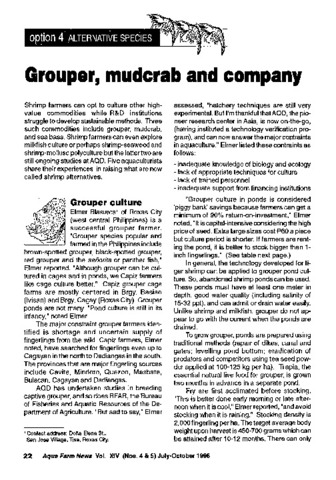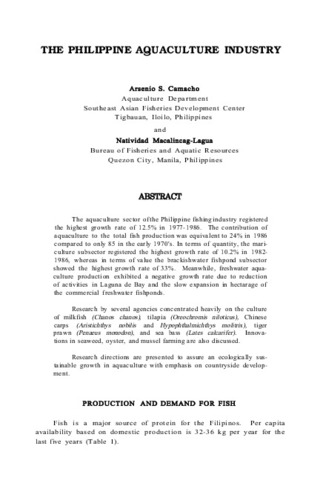| dc.contributor.author | de los Reyes Jr., Aurelio Alfonso | |
| dc.contributor.editor | Maeda, Masachika | |
| dc.contributor.editor | Maeno, Yukio | |
| dc.contributor.editor | Yokoyama, M. | |
| dc.date.accessioned | 2011-06-22T09:36:04Z | |
| dc.date.available | 2011-06-22T09:36:04Z | |
| dc.date.issued | 2002 | |
| dc.identifier.citation | de los Reyes Jr., A. A. (2002). Development of environment-friendly aquaculture technologies and practices. In M. Maeda, Y. Maeno, & M. Yokoyama (Eds.), Studies on Sustainable Production Systems of Aquatic Animals in Brackish Mangrove Areas (pp. 67-76). Japan: Japan International Research Center for Agricultural Sciences. | en |
| dc.identifier.uri | http://hdl.handle.net/10862/496 | |
| dc.description.abstract | The significant role of aquaculture in providing food security has been recognized, not only through its contribution to food supply, but also through the promotion of economic and social well-being. Aquaculture is also considered as a relatively recent and underdeveloped sector as compared to agriculture and animal husbandry, and there is a huge, unfulfilled potential in many countries, particularly in the region. The recently concluded ASEAN-SEAFDEC Conference “Fish for the People” highlighted the importance of sustainable fisheries for regional food security, and the need for comprehensive and cooperative efforts, resolutions and plan of actions among all stakeholders. With the projected shortfall in the supply of fish and fishery products to meet the demands of an ever-increasing population, aquaculture is looked upon as a sustainable source of renewable food resources.
One of the main programs of the SEAFDEC Aquaculture Department (AQD) is geared towards the development of sustainable aquaculture that is technically feasible, economically viable, environment-friendly, and socially equitable. An important subprogram is the development of environment-friendly aquaculture technologies and practices. The objectives of the subprogram are: 1) to develop and promote efficient aquaculture systems and designs for maximum sustainable productivity; 2) to devise and determine appropriate design, equipment, and operation and management practices that optimize utilization of resources and inputs, minimize adverse impacts on the environment, and sustain biological/ecological diversity; 3) to demonstrate, verify, adopt, refine, and promote proven aquaculture technologies and practices; and 4) to advance the social, economic, cultural, and policy importance of the aquaculture sector at the local, national, and regional level. At present, the main research areas are in nutrient dynamics of aquaculture systems, feed and waste management, development of culture systems, including bioremediation strategies, conservation and sustainable utilization of resources for aquaculture, and socio-economic and policy issues in aquaculture. In addition, verification and refinement of developed aquaculture technologies, in support of re search and training activities, are conducted to explore the potential of aquaculture technologies for commercial adoption and demonstrate appropriate technologies and responsible aquaculture practices. The paper presents an overview of current research activities by the author, and with involvement of other researchers at SEAFDEC AQD, including future plans under this and related programs. | en |
| dc.language.iso | en | en |
| dc.publisher | Japan International Research Center for Agricultural Sciences | en |
| dc.relation.ispartof | In: Maeda, M., Maeno, Y., Yokoyama, M. (eds.). JIRCAS International Workshop. Studies on Sustainable Production Systems of Aquatic Animals in Brackishwater Mangrove Areas. [Ibaraki, Japan]: Japan International Research Center for Agricultural Sciences. pp. 67-76 | en |
| dc.subject | Philippines | en |
| dc.subject | milkfish | en |
| dc.subject | groupers | en |
| dc.subject | Orange-spotted grouper | en |
| dc.subject | Chanos chanos | en |
| dc.subject | Epinephelus coioides | en |
| dc.subject.lcc | VF SP 301 | |
| dc.title | Development of environment-friendly aquaculture technologies and practices | en |
| dc.type | Conference paper | en |
| dc.citation.spage | 67 | |
| dc.citation.epage | 76 | |
| dc.citation.conferenceTitle | Studies on Sustainable Production Systems of Aquatic Animals in Brackish Mangrove Areas | en |
| dc.subject.asfa | food fish | en |
| dc.subject.asfa | milkfish culture | en |
| dc.subject.asfa | grouper culture | en |
| dc.subject.asfa | shrimp culture | en |
| dc.subject.asfa | seaweed culture | en |
| dc.subject.asfa | recirculating aquaculture systems | en |
| dc.subject.asfa | mangroves | en |
| dc.subject.asfa | aquaculture effluents | en |
| dc.subject.asfa | wastewater treatment | en |
| dc.subject.asfa | aquaculture engineering | en |
| dc.subject.asfa | aquaculture techniques | en |
| dc.subject.asfa | sustainable aquaculture | en |
| dc.subject.asfa | seaweeds | en |
| dc.subject.scientificName | Chanos chanos | |
| dc.subject.scientificName | Gracilariopsis heteroclada | en |



